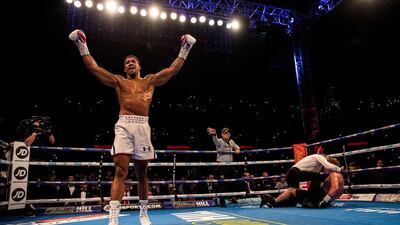Much was made of Anthony Joshua’s perceived negative demeanour in the weeks leading up to his world heavyweight title clash with Alexander Povetkin on Saturday night.
“He looked tired and withdrawn,” reflected Johnny Nelson, the former cruiserweight world champion and analyst on Sky Sports, after Joshua had extended his perfect professional record to 22 fights with an explosive seventh round knockout of his Russian opponent.
In front of 80,000 people, and under a light drizzle, the IBF, WBA and WBO title holder once again produced a thrilling performance on his return to Wembley Stadium – the venue of his all-time classic against Wladimir Klitschko 17 months ago.
____________
Read more:
Anthony Joshua under 'tons of pressure' ahead of fight with Alexander Povetkin
WBSS super-middleweight final: Guide to Groves v Smith in Saudi Arabia
Dillian Whyte targets Anthony Joshua rematch after thrilling win over Joseph Parker
____________
There was the expected pomp and ceremony as Joshua made his ring walk to a live performance from English rapper Nines, chants of “Anthony Joshua” – loosely based on the White Stripes’ Seven Nation Army anthem – rang around the arena as fire blasted out of cannons.
Then came the action itself – an absorbing, high-octane contest between two skilled operators with the propensity to land lights-out punches. After Povetkin rocked Joshua in the first two rounds, the champion found his range and composure before completing his night’s work with a clinical barrage in the seventh. It was a thoroughly enjoyable heavyweight scrap.
A packed out stadium of adoring fans, another knockout win, a successful defence of his titles and the latest multi-million-pound payday – it all seemed very trademark Joshua. So what was with all the pre-fight negativity?
It was widely assumed that Joshua’s apparent frustration was borne out of the criticism he received following the breakdown in negotiations with WBC champion Deontay Wilder.
It seemed the 28-year-old Briton was fielding more questions about a future unification showdown with the American than he was about Saturday night’s challenger, which must have become exasperating in the days leading up to such a big fight.
The fact Wembley has already been booked for April 13 – with the expectation that Joshua will face the winner of Wilder’s December clash with lineal champion Tyson Fury – has only added fuel to that particular fire.
Whoever was at fault for the collapsed talks – inevitably each side blamed the other – such is boxing’s convoluted, multi-federation setup, Joshua was ordered to face the mandatory challenger for his IBF title, Povetkin, or risk losing the belt.
Despite being at the mercy of boxing politics, Joshua and his team nonetheless were targeted by sections of a boxing community who have been let down too many times by the failure of mega-fights to materialise.
Combining the Wilder situation with Joshua’s previous two outings – a laboured stoppage win over Carlos Takam and an efficient points victory against Joseph Parker – there was a sense that fight fans were demanding more from their man, a return to the thrills and spills offered up by his battle with Klitschko and each of the vanquished opponents that preceded that epic night. Perhaps then Joshua has become a victim of his own remarkable success.
As it transpired, Joshua's supposed "tired and withdrawn" attitude was more likely caused by illness and injury. In an interview with iFL TV, promoter Eddie Hearn said Joshua had endured a "horrific" training camp, revealing how his fighter even struggled to put on his glove moments before the ring walk due to a thumb injury.
With so much on the line, including his titles, reputation, unbeaten record and a potential era-defining fight with Wilder, there is little wonder a less than ideal camp meant Joshua was short of his usually engaging and media-savvy best.
By defeating Povetkin - a fellow Olympic gold medallist and former world champion - in such devastating style and in light of the setbacks endured, Joshua not only deserves immense credit and recognition, but has silenced those who sought to criticise him - at least for now.
That being said, Joshua and his team know that unless the fight with Wilder is signed, sealed and delivered for next year, the naysayers will soon return and grow in numbers.
Joshua insisted in the ring post-fight on Saturday that "my No 1 would be Wilder" for his April 13 opponent. The entire boxing community hopes his wish will be granted.

